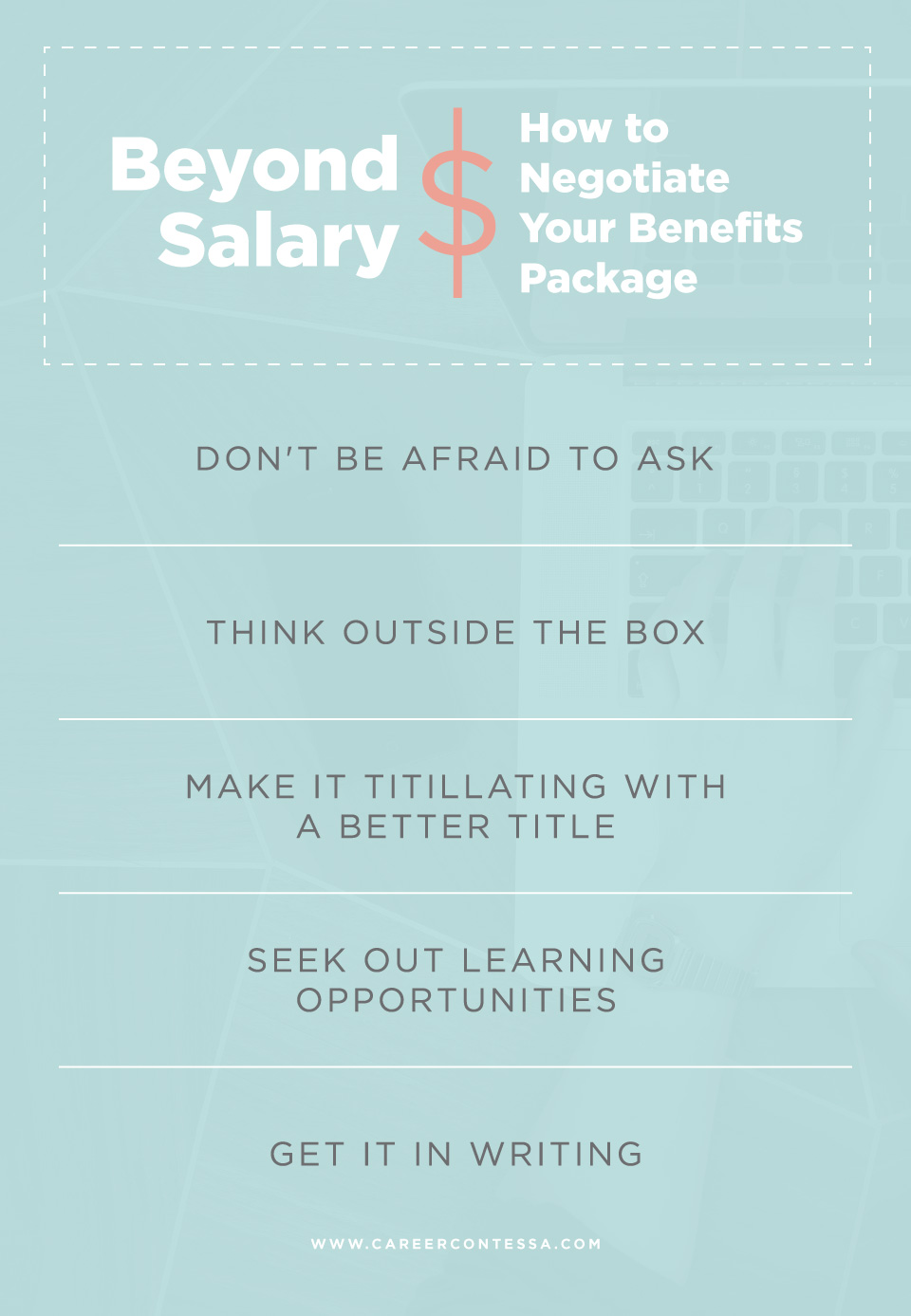When your job offer comes with a less-than salary, consider negotiating your benefits.
You got the job—go you!
As exciting and enticing as it can be to just sign on the line and go buy yourself something nice, this is actually exactly the moment you need to take a step back. Before you reply to that offer letter, try your hand at some next-level negotiation.
Considering a company's offer is like dating—it’s all too easy to focus on whether they like you and want you—all while losing sight of whether you like them.
Before you accept or reject a job based on salary alone, make sure that you're looking at the whole picture. We're talking about the entire compensation package.
Salary Isn't Everything: Why Benefits Are Important
The thing many of us don’t realize is that a company’s standard benefits package is usually negotiable. Perks play a surprisingly powerful role in how you'll feel about the job—in the end, they can make a seemingly average salary offer quite tantalizing. Beyond that, employee benefits often signify how much a company really cares about its employees.
If the offered
base salary is far below your entire
desired salary range, no amount of happy hours is going to make up the difference. However, having your health insurance entirely covered and a stipend for a gym membership might just make it so that you're breaking even.
Think creatively. Don't discount the case for more PTO being a great replacement for a higher salary. For example, ask yourself this question:
If your boss offered you the choice between a 20 percent pay increase or every Friday off, what would you choose? Which would have the bigger impact on your life?
We're not saying one is better or worse than the other, but we are asking you to consider what is important to you.
You'll also like:
5 Tips to Negotiate Your Compensation Package
1. Don't Be Afraid to Ask
We have gone deeper into the psychology behind the fear of
asking for what we deserve—especially at work. It boils down to a fear of rejection and a re-evaluation of your own self-worth.
When you’ve received an offer, you have the upper hand. While you may not get the requests you make, this is the one time that your prospective employer is ripe for negotiating. Plus, you may find that while there’s no leeway for negotiating a higher salary, benefits adjustments are easier to accommodate.
2. Think Outside of the Paycheck Box
The question "What's your salary?" should never have a straightforward answer.
While your gross salary might be $70,000 annually, how much of your health insurance does your boss cover? How much vacation time do you receive, both paid or unpaid? If you were to start a family, are there parental leave benefits?
While job searching, we can get bogged down in the question of salary, but let's reimagine what a salary actually is—and what our ideal salary really looks like.
Here are a few benefits you can negotiate:
- Stock options
- Better health benefits
- Benefits start date
- Work flexibility (including flexible hours, remote work, or hybrid work)
- Increased paid vacation time
- Increased unpaid vacation time
- Increased paid personal days
- Tuition reimbursement or learning stipends
- Parental leave or increased parental leave
- Performance-based bonuses
- Reimbursement for work-related subscriptions
- Upgraded company laptop
- Wellness programs and accompanying health benefits (e.g., gym membership reimbursement, fitness tracker, meditation apps, etc.)
When I negotiated my
benefits package, I landed a complimentary gym membership and a cell phone. Apparently, I was the first employee prospect to negotiate a free gym membership, but because wellness is important to me, I thought it was a reasonable benefit to request.
Interestingly, within a year, my company started offering complimentary gym memberships to all employees. A little part of me hopes I paved the way for others.
Also, look closely at your paid time off. Whether it’s vacation, personal, or sick time, you might be in for a surprise if the offer includes fewer days than what you’d expect. Make sure to ask for more if you know that downtime is essential to your mental and professional well-being. No one likes taking a vacation day to cover strep throat.
3. Get a Better Title
If you really want the job but there's a salary cap, how about asking for a better title?
It may be a perk you can’t really quantify, but it can help you in many ways. Having a more marketable and impressive title opens more doors for you—both in your current company and when you look for your next job.
For example, if you're described as a coordinator, but you know you're more of a manager, get that title in place. To determine what you think your correct title might be, consider consulting the company's leveling guide—it should advise you as to the specific responsibilities for your role.
4. Seek Out Learning Opportunities
Asking about
educational opportunities signifies that you are looking to learn and grow your skills and responsibilities. This also opens the door for potential opportunities for personal career growth, like conferences, seminars, certifications, and even degree programs that you may not otherwise have access to.
If there's a specific conference you want to attend the first year you start,
call it out specifically as a negotiation tactic. You'll be surprised at how much asking for professional development will garner you respect and also incredible career and travel opportunities—an education on both fronts.
5. Get Everything in Writing
When all is said and done, make sure to take the time to read and understand the offer and agreed-upon negotiations. To that end, save all communications, including emails. This will avoid any after-the-fact misunderstandings and ensure that you're able to enjoy the benefits
you worked so hard to negotiate.
By putting aside fears of rejection, negotiating benefits can be an enlightening and fruitful process. Armed with these tactics, you should feel comfortable knowing that you sought out the kind of benefits that will serve you and your future.
6. Make Compromises Between You and Your Career
Finally, we'd like you to consider that every job isn't perfect. Sometimes we make compromises that could repave our career paths in new and exciting ways. Really!
While the salary might not be ideal, could this job be a huge learning opportunity for you? Could this be
your good enough job—the job that ends up being the stepping stone to a huge career opportunity in the future? Think about it.
Enter into a sort of negotiation process with yourself, too. Pay attention to what really matters today, tomorrow, and in the long-run.












